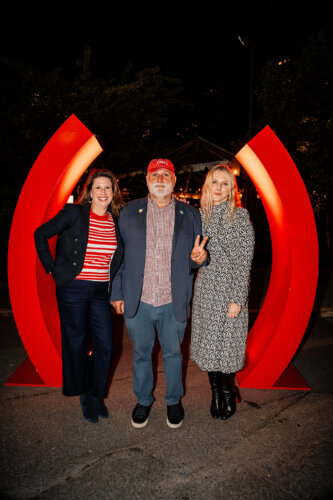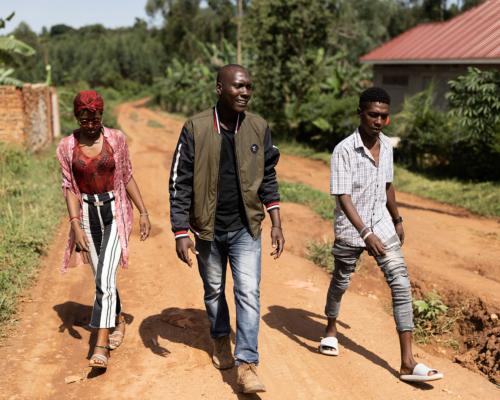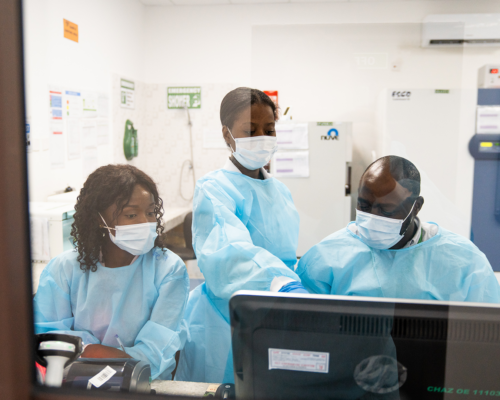Meet 3 Innovative Companies That Are Leveraging Technology To Transform Healthcare

This is a guest blog post by (RED) President and COO Jennifer Lotito
The new year is a time for new beginnings and renewed optimism. And one area that’s filling (RED) with hope is the progress we’ve seen in global health, especially among children.
Consider this: In 1950, one in four children did not live to adulthood. Today, the child death rate has declined to around 4%.
Since the turn of the millennium, the number of new child HIV infections declined by 75%. A recent UNAIDS report found that in 2022, the fewest number of children acquired HIV since the 1980s.
This is a major cause for celebration, but we cannot be satisfied by our remarkable progress alone. While it may not make headlines every day, AIDS is still a crisis. One child dies from AIDS every five minutes.
If we want all children to live healthy and productive lives, the public and private sectors must direct more resources to marginalized communities. Few know this challenge and opportunity better than (RED)’s incredible life science partners, which include Merck, IQVIA, and Roche. In addition to the outstanding advancements these companies are contributing to the fields of medicine, data analytics, and diagnostics, they are also committing both cash and heat to helping (RED) fight global health injustices that impact the world’s most vulnerable.
Beyond (RED)’s life-saving, life science coalition, there is so much happening in healthcare – from the promise of transformative technologies to the advent of artificial intelligence – that is nothing short of inspiring. Here are just a few of the many companies we’ve encountered that are building a stronger global health future – for children, and everyone.
Zipline: Transforming Healthcare Delivery & Logistics
Patients in need of emergency blood transfusions at Rwanda’s Nyanza Hospital used to wait nearly three hours for blood to be delivered from the country’s capital city, Kigali. It now takes as little as fifteen minutes.
“Three hours can make the difference between saving or losing a life,” the hospital’s head surgeon, Dr. Roger Nyonzima, told TIME.
Behind this incredible advancement is Zipline, a drone delivery and logistics company that has partnered with five African countries to deliver vital medical supplies to remote regions. Zipline’s AI-powered drones have significantly reduced delivery times, saved countless lives by ensuring prompt medical interventions, and underscored the potential for technology to bridge healthcare gaps worldwide. To date, Zipline has recorded over 850,000 autonomous deliveries and has delivered over 14 million vaccine doses to those most in need.
As Miki Sofer, the Senior Vice President of Global Health Partnerships at Zipline, told (RED) in Davos last month, just by having health supplies available, certain communities in Rwanda have seen a 51% drop in maternal mortality, and parts of Ghana have experienced a 21% increase in vaccination rates. This has a major impact because “missed opportunities for treatment go down and reliability and faith in the health system goes up,” she said.
This efficient and eco-friendly approach not only accelerates the delivery of supplies to remote areas but also serves as a model for sustainable healthcare logistics. Each day, Zipline is reducing the sector’s carbon footprint and demonstrating how technology can revolutionize healthcare while preserving the planet.
Cepheid: Increasing Access To Testing
When South African doctor Zolewa Sifumba began experiencing tuberculosis-like symptoms, she immediately got tested. Her doctor then told her to go home and wait for her results, which sometimes take days — putting her family and friends at risk.
Sifumba’s story is far too common, and it underscores the importance of accurate and rapid diagnostics in fighting preventable diseases. Without testing, treatment is impossible.
Cepheid, a California-based diagnostics company, knows this all too well. Their molecular testing systems enable quick and precise identification of diseases like AIDS and tuberculosis and provide doctors with life-saving medical information in hours, not days.
Through the development of its GeneXpert platform, Cepheid has created the Xpert HIV-1 Viral Load test that provides accurate and fast results, enabling healthcare providers to monitor HIV progression in drastically less time. And these tests are user-friendly and portable, making them valuable in resource-limited settings or regions with limited laboratory infrastructure.
By offering reliable diagnostic tools, Cepheid is playing a pivotal role in increasing global access to testing and improving public health outcomes worldwide.
“Ending TB in 2035 is possible, but we need diagnostics that are fast, that give answers within a certain amount of time so that people can get treated within a certain amount of time,” Sifumba said in a recent interview.
Novartis: Leveraging AI For Good
If harnessed correctly, artificial intelligence could be the biggest game changer for global health in generations.
Novartis, a Switzerland-based pharmaceutical company, is leveraging cutting-edge technologies like artificial intelligence to advance global health outcomes. Novartis has embraced digital technologies to strengthen global health, and the company’s focus on equity and accessibility has helped ensure these life-changing innovations reach individuals in places where injustice enables preventable diseases to thrive.
In particular, Novartis is leveraging AI to advance drug discovery and development. They’ve established a code of ethics to guide their AI usage that aims to improve healthcare while also reducing bias and protecting privacy. Through private and public sector partnerships, Novartis supports initiatives that expand access to life-saving tools in underserved regions, particularly in low- and middle-income countries.
“At Novartis, we are reimagining medicine by using innovative science and technology to address some of society’s most challenging and long-standing healthcare issues,” said Novartis CEO Dr. Vasant Narasimhan.
Why It Matters
If we want to build a stronger global health future, the private sector must play a leading role.
Every day, (RED)’s life science partners like Merck, IQVIA, and Roche are doing this important work. Moreover, companies like Zipline, Cepheid, and Novartis are demonstrating how new technologies can create a more effective and cost-efficient healthcare system that better serves the climate, its citizens, and the world’s most vulnerable.
It’s heartening to see this leadership in action. We need more of it in 2024.


